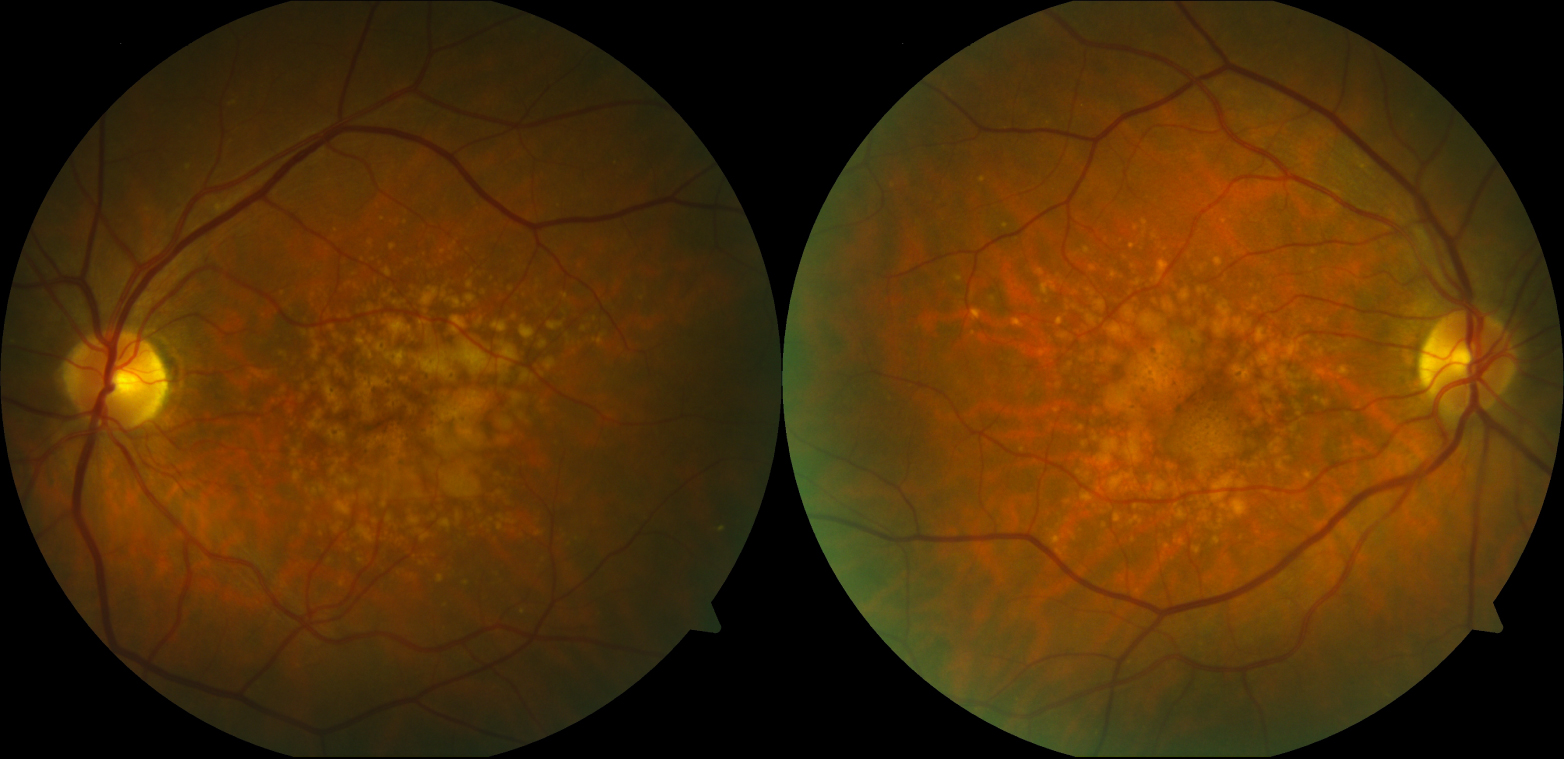
The Retina
The retina is a thin lining of nerve tissue inside the back of the eye. Like the film in a camera, it allows light to be detected and processed before the image is sent along the optic nerve to the brain. Because the retina plays such a vital role in vision, retinal health has a huge impact on the clarity and quality of vision.
Macular Degeneration
The macula is the center and most important part of the retina for seeing details. In age related macular degeneration (AMD) there is disease of the central retina and underlying pigmented cells needed for vision. The pigmented cells accumulate waste products, clump together, and lose the ability to keep the retina healthy and working. The retina and underlying tissue can become thin. This type of macular degeneration is called dry macular degeneration or non-exudative macular degeneration and makes up the majority of macular degeneration cases. With dry macular degeneration patients often describe blurry central vision, a fuzzy spot in the center of their vision, and difficulty with reading. There is no treatment for dry macular degeneration except the use of oral supplements (AREDS-2 formula vitamins). Some dry macular degeneration can become so severe so that reading becomes difficult if not impossible. Dry macular degeneration needs monitoring by doctors with the help of retina scans called optical coherence tomography (OCT) which can detect the severity of macular degeneration changes.
``Retinal Health has a Huge Impact on the Clarity and Quality of Vision.``
Occasionally, abnormal blood vessels grow under the retina in areas of dry macular degeneration. When this occurs we now call it wet macular degeneration or exudative macular degeneration. So dry macular degeneration can turn into the wet form and will remain. Many patients don’t understand that when wet disease occurs, dry macular degeneration is still present and still causes some visual symptoms and will always remain. In wet disease the new vessels leak fluid or bleed causing a more rapid vision loss often with distortion of straight objects making them appear bent or wavy. Timely treatment of wet macular degeneration can usually slow, halt, or even improve the associated vision loss. Wet macular degeneration is treated with injections in the eye (intravitreal injections) of various biologic medicines that can help (but not cure) the leakage and bleeding. The injections need to be repeated on a regular basis to keep severe vision loss at bay, and regular OCT retinal scans need to be performed.
Diabetic Retinopathy
Your body can be affected by diabetes in many ways. It can affect your vision by causing cataracts, glaucoma and damage to the blood vessels in your eyes. High blood sugar levels can cause abnormalities in the small blood vessels in the retina, the nerve layer at the back of the eye that senses light. Normally, the blood vessels in the retina do not leak. In diabetic eye disease, the retinal blood vessels develop leaks, allowing fluid or blood to accumulate in the retina causing decreased vision or sometimes no symptoms at all. At this point it is called nonproliferative diabetic retinopathy or background diabetic retinopathy. Bleeding or leaking of fluid may cause retinal swelling, keeping the retina from working properly. Longstanding diabetes may also cause blockage of retinal blood vessels. Since the retina depends on blood vessels for nutrition, this blockage keeps the retina from functioning properly. The impaired retina sends out chemical signals to promote new blood vessel growth. At this point we call it proliferative diabetic retinopathy which can lead to more severe vision loss. The fragile new blood vessels easily bleed and cause scarring. Floaters, vision loss and retinal detachment may result.
Diabetic retinopathy is monitored with dilated eye exams and retina scans and photographs. It can be treated with intravitreal injections and sometimes laser treatment depending on it’s clinical picture and severity. If blood in the vitreous doesn’t clear, or a retinal detachment occurs then surgery with a retinal specialist may be indicated.
Other Retinal Diseases
The doctors at the Chippewa Valley Eye Clinic, Chippewa Falls, SC are able to diagnose and monitor numerous retinal diseases and help decide if you need treatment for these conditions. These include retinal vein occlusions, retinal artery occlusions, retinal tears/holes, retinal detachment and macular holes. Another common finding is a wrinkle in the macular area often called an epiretinal membrane, surface wrinkling retinopathy, macular pucker, or cellophane retinopathy. This needs to be monitored with regular OCT scans to determine if it gets worse requiring surgery with a retinal specialist.
